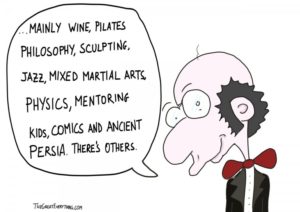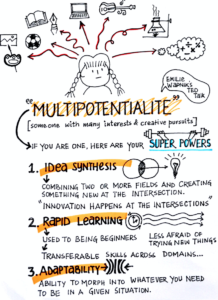Can’t define your true calling? You are not alone.
Do these questions cause anxiety:
What is your passion?
Can you define your life’s purpose?
What do you want to be when you grow up?

The sense of frustration does not come from articulating what you want but from being forced to narrow your focus to just one thing.
A Multipotentialite is one who chooses to pursue and excel in more than more than one field. Generally the term refers to individuals who are talented in disparate disciplines. They don’t just operate in multiple areas, they stand out in at least two.
Multipotentialites might be polymaths, generalists, ubermensch, career scanners or renaissance people. They might have portfolio careers. Often, they have achieved mastery in seemingly incoherent disciplines. A negative frame might label the multipotentialite as a dilettante, half-baked, a jack of all trades (master of none).
This is a concept that runs counter to the received wisdom from experts in performance coaching, branding, marketing and strategy. Success will follow the refinement of purpose. Singularity is key. We must specialise or perish. Don’t confuse your message. Remember the U in your USP.
Maybe this approach is not axiomatic. Maybe, for some, the very essence of their value lies in their cross-disciplinary approach. If this is true, could the same be said for businesses?
Refuse to Choose
In her book Refuse to Choose, Barbara Sher explores the mindset of the ‘undiagnosed scanners’. She liberates those that are inspired by the breadth of ideas. These same people may be demotivated by forced choice in their career or their hobbies.
Sher’s work explores the life of the scanner. She recognises that the folly of the scanner is non-completion. This is a guide book for multipotentialites to combine their passions, finish what they start and find fulfilment by embracing their natural tendencies.
Find Your Superpower
Emile Wapnick has created a delightful online home, called Puttylike, for self proclaimed multipotentialites. In her TED Talk she identifies thee superpowers of the multipotentialite:

Wapnick emphasises that we are all wired differently. If you are interested in one particular field and you want to dive deep, become an expert then you are a specialist. Great. Not everyone is destined for this path. Perhaps this path leaves you cold. You like the idea of building knowledge and expertise but you are inspired by disparate disciplines then you may be a multipotentialite.
Innovation
The ‘aha moment’ often comes when you remove yourself from active problem solving. It’s Archimedes in the bath or Newton sitting under the apple tree.
The Renaissance mind values a breadth of ideas. The Renaissance, no coincidence, was a period of human history characterised by social and scientific advancements.
In our modern age where output is prized we favour specialisation, sometimes hyper-specialisation. A good strategy is one that has focus. The more myopic the better. Easier to understand, easier to lead and easier to communicate. And yet, our collective attention is drawn to the successful polymaths in our midst.
Innovation is often born in the intersection of ideas. The petri dish of creativity involves a web of ideas, language and discourse. Innovation may favour the multipotentialite as these are the people that can most readily leap from one discipline to another.
Multipotentialites of Note
Elon Musk – physics, business, environmentalism
Leonardo Da Vinci – art, science, nature
Maya Angelou – literature, civil rights, poetry
Steve Jobs – computer science, calligraphy, business
Goethe – law, religion, politics, literature
Eleanor Roosevelt – engineering, human rights, politics
Embracing the Multipotentialite Spirit
You may find that from the outside, the multipotentialite may appear unfocussed or even counterproductive. We should pause to appreciate the synthesis of ideas happening at the synaptic level. What looks like randomness might actually be genius.
“I say unto you: one must still have chaos in oneself to be able to give birth to a dancing star.”
-Friedrich Neitzshe, Thus Spoke Zarathustra


